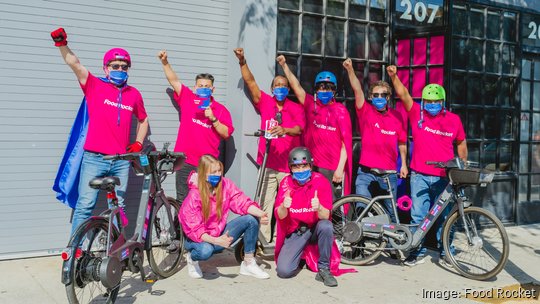
Rapid delivery startup Food Rocket is packing up its Chicago headquarters after just a year as it moves all resources to a new priority market.
The scrappy startup, which promises doorstep delivery of convenience staples in 15 minutes or less, was founded in the Bay Area and moved its headquarters to Chicago a year ago. Now, the company is ceasing all San Francisco service from its non-consumer-facing storefront as it moves its headquarters to Charlotte and redirects most if not all of its Midwest operations there.
"The decision is related to an unstable economic environment and rising inflation, which negatively impact the startup’s business model," Food Rocket said in a news release yesterday afternoon. "All (capital expenditures) and (operating expense) budgets will be shifted to the region, and the company will offer voluntary relocation options to as many team members as possible to ease the transition."
The startup said it must "continue improving efficiency, reducing costs and strengthening its strategic focus on North Carolina," where the company entered the market last year via partnership with retailer Circle K, delivering an assortment of up to 7,000 SKUs from the convenience chain's inventory. That agreement has led to "significantly" lower operational costs, Food Rocket said. Circle K's parent company, Quebec-based Alimentation Couche-Tard — which has more than 14,000 stores worldwide (about half in the U.S.) — acquired a minority stake in Food Rocket in 2022.
CEO and co-founder Vitaly Alexandrov called leaving San Francisco a "tough decision" but a necessary one to "support our people in other locations." He claimed the initial California-based team — Food Rocket also had office space in Palo Alto — "made history by launching the first 10-minute delivery service in the Bay Area."
Launched in eye-catching bright neon pink in early 2021 as one of that year's many rapid delivery upstarts, Food Rocket sought to out speed delivery giants such as Instacart, DoorDash and UberEats while offering no minimum order limits or delivery fees and aggressive new user discounts.
To date, Food Rocket has raised $27 million, including a $25 million Series A round led by Alimentation Couche-Tard, announced in April 2022. At the time, the company said the funds would be used to expand service in existing markets with 15 new stores between Chicago and San Francisco as well as into new markets in Boston, Philadelphia and Los Angeles.
While the Uber-backed GoPuff — a Philadelphia upstart in the rapid convenience space — evolved into a regular major player, using the backrooms of BevMo stores as micro-warehouses after acquiring the chain for $350 million in 2020, many other rapid delivery companies struggled under the strain of inevitable last-mile challenges and consumers ready to take advantage of scale-chasing promotions. Meanwhile San Francisco's DoorDash — having evolved laterally beyond food delivery and not immune to layoffs of its own — is coming off a hot earnings report and an announced buyback of $750 million in shares.
Food Rocket also leased retail space in San Francisco. It used what would typically be storefronts as convenient launching pads for rapid delivery via bike couriers (unlike most delivery startups, they were full-time employees rather than contractors, the company said). The startup claims it takes about two to three minutes to process orders and another 10 minutes for delivery — and says if the delivery arrives late, it's free.
Even as Food Rocket presumably prepared for an exit in recent months, coupons for the service were endemic in some San Francisco neighborhoods, though sometimes advertising products such as alcohol that weren't available in the app.



